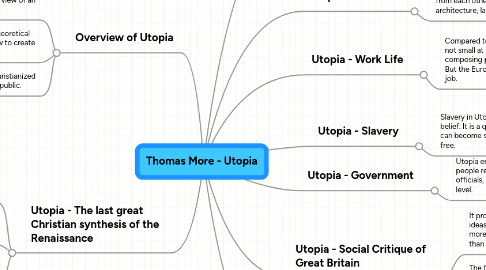Thomas More - Utopia
by Ira Rodriguez

1. Overview of Utopia
1.1. Thomas More's Utopia is a Christian- humanist view of an ideal society.
1.2. More does not not simply offer a theoretical view, but provides specifics for how to create this world.
1.3. Utopia offers a Christianized from of Plato's Republic.
2. Utopia - The last great Christian synthesis of the Renaissance
2.1. The Christian aspect of the synthesis is Christ's gospel of caring for the poor, the oppressed and the downtrodden.
2.2. The Platonic, Republican tradition is the Greek aspect of synthesis.
2.3. More wrote Utopia with a comedic tone, allowing him to speak his truth while telling deeper story.
3. Utopia - Use of humor and Parody
3.1. Sir Thomas More does not believe that a Utopia is possible.
3.2. More does comment to the reader, however, that he thinks many of the Utopian ways of life are absurd, from their methods of warfare to religion, but most especially in the doctrine of communal property. It is from private property that all nobility, magnificence, splendor, and majesty spring, and it is these things, in More's view, that are the crowning glory of European society.
4. Utopia - Division
4.1. Everything in Utopia is as similar as it possibly can be. According to Hythloday the cities are almost indistinguishable from each other. They have virtually the same populations, architecture, layouts, and customs.
5. Utopia - Work Life
5.1. Compared to Europeans of the sixteenth century, however, the range is not small at all. True, a European noble was freer to do what he would--from composing poetry to lying around eating figs--than any Utopian. But the European lower classes had absolutely no mobility in terms of job.
6. Utopia - Government
6.1. Utopia employs a democratic government, its people represented by two layers of elected public officials, the higher level selected by the lower level.
7. Utopia - Social Critique of Great Britain
7.1. It proves his point that at court his ideas will be judged by counselors more interested in wealth and power than truth or rationality.
7.2. The fault with the practice on both religious and secular grounds and is so convincing in its portrayal of capital punishment as both immoral and ineffective that it serves as a condemnation of the practice throughout England
8. Utopia - Search of Hapiness
8.1. Only way to perfection and hapiness is through Christianity and the coming on Christ.
9. Utopia - Slavery
9.1. Slavery in Utopia is not a question of race, ethnicity, or belief. It is a question of moral behavior. Only criminals can become slaves, and the children of slaves are born free.


